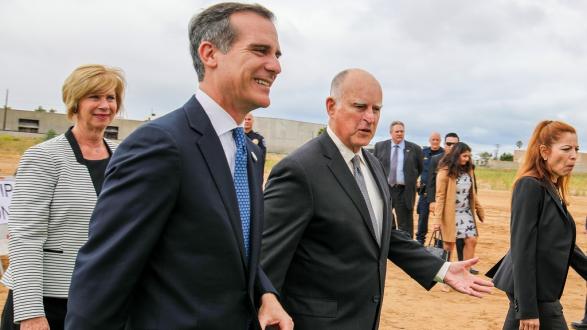Republican political philosophy has always touted the strong belief in states' rights, and moreover, states' rights over the rights of the federal government. Politicians, candidates, and voters have all lauded the importance of "bringing power back to the states" in order to maintain a proper balance between the federal government and the individual.
So isn’t the new resurgence of cities and states as a response to Trumpism a conservative proposal at its core? It might have been seen as such five years ago. But since the rise of populism and the election of President Trump, it seems Republicans are more concerned about bowing to the president instead of standing up for one of their core principles: preventing the consolidation of power within the federal government and allowing individual states to make their own decisions about what is best for its own people.
Isn’t the new resurgence of cities and states as a response to Trumpism a conservative proposal at its core?
With this principle it mind, it would only seem that the rise of cities and states in response to Trump is a good thing for Republicans. Cities like Los Angeles and New York are embracing their unique standing as a global city. Last year, the City of Los Angeles appointed a Deputy Mayor for International Affairs, Pacific Council director Nina Hachigian, who served as the U.S. Ambassador to ASEAN. Together, Hachigian and Mayor Eric Garcetti have strengthened LA’s ties to the global community by encouraging increased trade, foreign investment, and cultural relations with places like Southeast Asia, Europe, and Latin America.
New York City has a similar counterpart in Penny Abeywardena, the city's commissioner for international affairs, who, among many other things, is working to implement the UN Sustainable Development Goals at the local level and teach New Yorkers about the importance of the United Nations as an institution, and how they can get involved in global affairs.
These cities are also utilizing public-private partnerships to get things done. For example, the City of LA partnered with WeWork, Clean Energy Smart Manufacturing Innovation Institute, the U.S. Department of Energy, UCLA, and others to expand clean energy and drive technology jobs. The city also created a public-private partnership to address the immigration issue and provide legal assistance to immigrants facing deportation.
The city’s climate action plan also promotes partnerships with the private sector. On the state level, Governor Jerry brown has been dubbed "America’s unofficial climate change ambassador" by promoting climate policies abroad, in addition to focusing on human trafficking, gang violence, and more.
So why are Republicans so against local power? Isn’t it the Republican dream to reduce the size of the federal government at the benefit of states?
So why are Republicans so against local power? Isn’t it the Republican dream to reduce the size of the federal government at the benefit of states and promote public-private partnerships to save money? What about balancing federal decisions with policies that make most sense to local constituencies?
Or is it because the very initiatives these cities are pushing are policies President Trump opposes? In 2018, "bringing power back to the states" is no longer a good thing if it means President Trump loses some of that power. Maybe the Democrats are now the party of local power.
In 2018, "bringing power back to the states" is no longer a good thing if it means President Trump loses some of that power. Maybe the Democrats are now the party of local power.
Where does that leave the Republican Party? The party would do well to remember their uproar over President Obama’s expansion of federal power. Instead of defending Trump’s arguments that he has the power to "pardon himself," a clear expansion of federal power the likes of which we have never seen, perhaps Republicans would do well to reach across the aisle and see what ways they can enact change at home. Maybe it’s time to follow suit and embrace the state (or city)’s right to create policy and advocate for the United States abroad. The future is local, and if the true Republican Party is going to last, it should look closer to home to create real policies for Americans and forge real relationships with the global community.
________________________
Madison Jones McAleese is the communications associate at the Pacific Council on International Policy. She previously worked as a graduate fellow at the USC Center on Public Diplomacy, and she has a Master’s degree in Public Diplomacy from the University of Southern California.
The views and opinions expressed here are those of the author and do not necessarily relfect the official policy or position of the Pacific Council.




